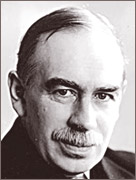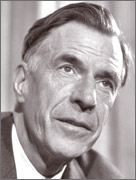Fixing the world
 ‘Small is beautiful’, Ernst Friedrich Schumacher’s seminal collection
of essays published in 1973, was subtitled ‘a study of economics as if
people mattered’. The author, who was profoundly influenced by Theravada
Buddhism, was concerned that the modern world was putting economic
growth before human development, greed before compassion. ‘Small is beautiful’, Ernst Friedrich Schumacher’s seminal collection
of essays published in 1973, was subtitled ‘a study of economics as if
people mattered’. The author, who was profoundly influenced by Theravada
Buddhism, was concerned that the modern world was putting economic
growth before human development, greed before compassion.
Schumacher was writing at the peak of the post-war economic boom, for
which his guru, the British economist John Maynard Keynes, was partly
responsible. At the depth of the Great Depression of the 1930s,
reformist leaders such as the great American President Franklin D
Roosevelt applied Keynesian policies of public spending on welfare and
infrastructure to jump-start economic growth.
Following the Second World War, these policies were used by
Roosevelt’s successors, in the Marshall Plan to revitalise the moribund
industrial economies of Europe. This resulted in an unprecedented,
protracted period of economic growth, which saw consumption rise in the
industrialised nations and which sucked into its wake a number of
‘Tigers’ or ‘Newly industrialised Countries’ (NICs), such as Singapore,
South Korea and Mexico.
 |
|
Ernst
Friedrich Schumacher |
 |
|
John
Maynard Keynes |
 |
|
John
Kenneth Galbraith |
By the 1960s, Schumacher’s other guru, the Canadian-American
economist John Kenneth Galbraith, came to the conclusion that growth had
been sufficient to allow a comfortable lifestyle to be spread around; he
advocated greater spending on the poor and on third world countries.
World economy
In 1972, the Club of Rome came out with ‘The limits to growth’, a
report on the computer simulation of the future trends in the world
economy based of five principle variables: population,
industrialisation, food production, pollution and resource depletion.
The model predicted that, at current growth rates, the world economy and
society were due to collapse.
Schumacher created a synthesis of these threads in economic thinking
and became the godfather of the ‘Green’ movement, which advocates better
regulated, more people-and environment-friendly policies - in other
words, ‘sustainable development’.
Unfortunately, Schumacher, the Club of Rome and the Green movement
generally were dismissed as ‘prophets of doom’. Notwithstanding,
far-seeing leaders such as US President Jimmy Carter tried to implement
some of the policies advocated by the Greens.
In 1979, Margaret Thatcher became Prime Minister of Britain and,
together with Ronald Reagan (who became US President shortly
afterwards), began a counter-revolution (prototyped by the bloody
fascist Pinochet regime in Chile) which overthrew post-war welfare
consensus and pushed back environmentalist reforms.
Financial institutions
The pace of globalisation picked up as ‘de-regulation’ - the removal
of environmental, economic and societal constraints on big business -
was implemented dogmatically by the adherents of the revisionist ‘free
market’ economists Friedrich August von Hayek and Milton Friedman.
The economic process of giving money to the ‘haves’ was mirrored by
the political process of emasculating democratic representative bodies
and empowering financial institutions.
This reactionary movement saw the enthroning of naked finance capital
over the productive capital of industrial and agricultural entrepreneurs
as well as over the people who do the actual work.
Global economics was reduced to the summation of a series of what
were effectively gambling operations on the world’s commodity, share and
financial markets.
Parallel to this, the environmental regulations of the 1970s were
rolled back. The burning of greenhouse-gas producing fossil fuels, which
had plateaued at about six billion tonnes of oil equivalent
annually, climbed by half as much again in 20 years.
The end result of the ‘free market’ counter-revolution is observable
in two conferences taking place this week: the G-20 summit in Los Cabos,
Mexico and the Rio+20 Earth Summit in Rio de Janeiro. The former is
trying to grapple with the collapsing world economy and the latter with
the disintegrating environment.
The current global economic crisis has its source in excessive
de-regulation of financial institutions, combined with unbalanced
economies due to the shift of production away from the traditional
industrialised economies to NICs. The world’s financial structure became
a gigantic Ponzi scheme which eventually collapsed, dragging down
billions of livelihoods with it.
The root cause of the problem was illustrated by the fact that US
President Barack Obama, German Chancellor Angela Merkel, British Prime
Minister David Cameron and several other leaders have snubbed Rio+20.
European Union
The poorer nations, backed by the rapidly growing BRICS (Brazil,
Russia, India, China and South Africa) grouping, had been calling for
support from the rich, greenhouse gas-emitting economies for third world
countries in order to make effective sustainable growth strategies.
This move was being resisted by the countries of the ‘First World’,
apparently undeterred by the ongoing degradation in the global
environment - A 2008 study by Graham Turner of Australia’s Commonwealth
Scientific and Industrial Research Organisation vindicated the Club of
Rome’s predictions.
These leaders did, however, attend the G20 meeting, which brings
together Argentina, Australia, Brazil, Britain, Canada, China,
France,Germany, India, Indonesia, Italy, Japan, Mexico, Russia, Saudi
Arabia, South Africa, South Korea, Turkey, the USA and the European
Union.
Western leaders have been panicked by the possible effects of the
Euro-zone crisis on financial markets.
This panic enabled the BRICS-led nations to indulge in some horse
trading. In return for their boosting the International Monetary Fund's
lending pool to $ US 456 billion, they managed to force the more
obdurate of western leaders to accede to giving support to struggling
European Union member states and to giving priority to investment in
infrastructure in developing countries as a way to stimulate global
growth.
The USA and Canada, however, refused to pledge assistance to a
bailout package for Europe. A clear pattern is emerging, of BRICS-led
countries trying to patch together solutions to the world’s problems and
First World countries following expedient, self-serving paths.
The world is broken and needs to be fixed. The leaders of the First
World, who have hitherto styled themselves the ‘international
community’, who are mainly responsible for this predicament, should
shoulder their fair share of the burden and behave as if we do not all
have another planet we can escape to.
|



